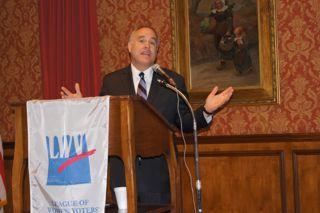Comptroller DiNapoli Concedes These Are Tough Times for Local Governments and School Districts
- Tuesday, 11 June 2013 16:17
- Last Updated: Tuesday, 11 June 2013 16:31
- Published: Tuesday, 11 June 2013 16:17
- Joanne Wallenstein
- Hits: 4557
 NYS Comptroller Thomas DiNapoli was in Scarsdale on June 6, 2013 to address the League of Women Voters of Westchester and I stopped by to see what he had to say about ballooning pension and retirement fund payments, unfunded state mandates and the tax cap that are decimating local school and village budgets.
NYS Comptroller Thomas DiNapoli was in Scarsdale on June 6, 2013 to address the League of Women Voters of Westchester and I stopped by to see what he had to say about ballooning pension and retirement fund payments, unfunded state mandates and the tax cap that are decimating local school and village budgets.
Before he turned to the issues that mattered to me, he provided an outlook on our economy, reporting that "statewide numbers are trending toward recovery with all of the indicators on the positive side." He called it a "tenuous recovery in slow motion" and told the group that unemployment numbers in the lower Hudson Valley were at 6.7%, better than the statewide statistic of 7.8%. He added that "Sequestration is causing problems for the NYS economy and in the next five years we could lose $5 billion dollars if this is not resolved."
Turning to local issues he agreed that these "are tough times for local governments and school districts," and offered little consolation  for local municipalities. In fact he said, "local stress is going to be the new normal. Healthcare and pensions will continue to go up and in the long term there will be impacts that will cause policy changes. With 2/3 of the school budgets that exceeded the cap defeated, the tax cap is going to force tough choices about spending."
for local municipalities. In fact he said, "local stress is going to be the new normal. Healthcare and pensions will continue to go up and in the long term there will be impacts that will cause policy changes. With 2/3 of the school budgets that exceeded the cap defeated, the tax cap is going to force tough choices about spending."
According to DiNapoli, when Governor Cuomo put forth the 2% tax cap "there was an expectation of mandate relief to make it easier to comply. However, mandate relief did not occur."
What to do? Unable to offer any financial benefits to strained school and village budgets, his office is publishing a list of "those cities under the most stress." Since, according to Di Napoli, the state does not "have money for bailouts, stress reporting will be an early warning system" for those facing possible bankruptcy.
Telling the group that a "well-funded pension plan is important for everyone," he claimed that New York has "the best funded pension plan," and has taken five years to work through losses suffered in 2008. He reported that for the past year they had a 10% positive return and after 2014 local schools and governments should see a reduction in the increases in payments for the fund.
 During the Q&A, time ran out before I could ask further questions about what mattered most to Scarsdale. I chased him down as he was leaving and told him about the resounding defeat of our local school budget for the first time in over 40 years, partially due to increased pension and retirement fund payments and state mandates. A resident of Great Neck, another district that prides itself in great schools, DiNapoli looked genuinely surprised about the news. I asked him if there was any hope that Governor Cuomo would negotiate with the unions for pension reform and he answered, "labor law is tricky stuff," and conjectured that "nothing will happen until after the election." We also discussed the tax cap and he said that in Massachusetts, when a cap was passed, the state came up with funds to shore up local budgets, which was not the case in New York.
During the Q&A, time ran out before I could ask further questions about what mattered most to Scarsdale. I chased him down as he was leaving and told him about the resounding defeat of our local school budget for the first time in over 40 years, partially due to increased pension and retirement fund payments and state mandates. A resident of Great Neck, another district that prides itself in great schools, DiNapoli looked genuinely surprised about the news. I asked him if there was any hope that Governor Cuomo would negotiate with the unions for pension reform and he answered, "labor law is tricky stuff," and conjectured that "nothing will happen until after the election." We also discussed the tax cap and he said that in Massachusetts, when a cap was passed, the state came up with funds to shore up local budgets, which was not the case in New York.
So what's the long and the short of it? Though he is clearly articulate and competent, DiNapoli doesn't appear to have answers. So let's take it to Albany and lobby our state senators and assemblymen, along with Governor Cuomo, who is balancing the state budget on our backs. The tax cap may have made him a hero to some, but to anyone who's attended a school or village board meeting this year, Cuomo is anything but heroic.
Meanwhile, State Senator Andrea Stewart-Cousins just announced the passage of a bill in the state senate requiring the state to pay for unfunded mandates.
The bill requires the state to fund any mandated program imposed on local governments and school districts and would protect local municipalities from bearing the cost of programs created and/ or originated by the State, allowing local officials to set their own priorities without the possibility of future unfunded mandated programs disrupting their budgets.
"Unfunded mandates create real struggles for local governments and school districts, so any steps we can take to relieve those burdens are welcome news. Cash-strapped local governments have had to make difficult choices through the recession and unfunded mandates have made that task even more difficult. This legislation places the responsibility of funding State mandated programs where it belongs, on the State," said Democratic Conference Leader Andrea Stewart-Cousins.
The legislation, S.1294, defines an unfunded mandate as "any state law, rule or regulation which establishes a new program requires a higher level of service for an existing program which a municipal corporation is required to provide, and which results in a net additional cost to such municipal corporation." It requires the state to provide school districts and local governments "compensation or funding... of the full amount of the net additional costs" of any unfunded mandate it imposed upon localities.







